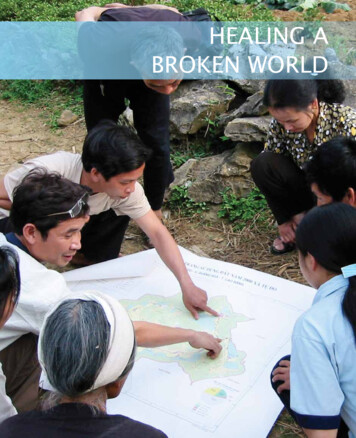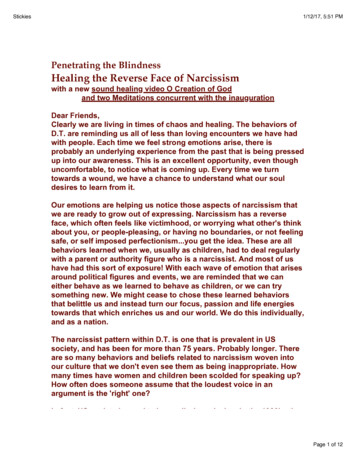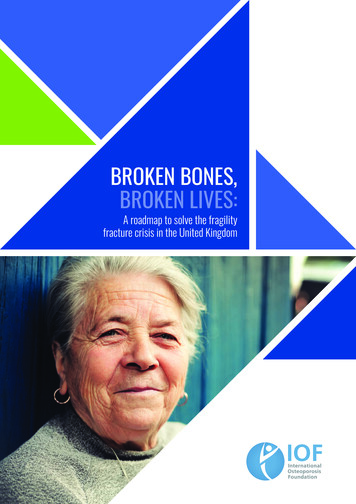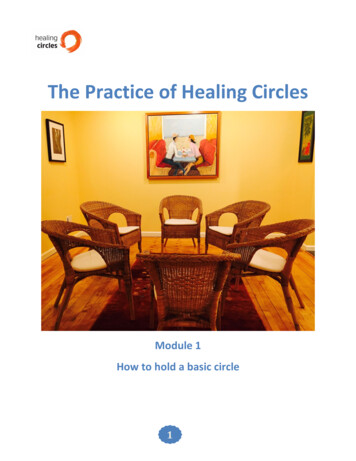
Transcription
HEALING ABROKEN WORLD1
Editor:Consultant Editor:Publishing Coordinator:Patxi Álvarez SJSuguna RamanathanTina NegriPromotio Iustitiae is published by the Social Justice Secretariat at the General Curia of theSociety of Jesus (Rome) in English, French, Italian and Spanish. Promotio Iustitiae is availableelectronically on the World Wide Web at the following address: www.sjweb.info/sjs/PJnew.If you are struck by an idea in this issue, your brief comment is very welcome. To send a letterto Promotio Iustitiae for inclusion in a future issue, please write to the fax or email addressshown on the back cover.The re-printing of the document is encouraged; please cite Promotio Iustitiae as the source,along with the address, and send a copy of the re-print to the Editor.‘Healing a Broken World’ describes the rationale of establishing the Task Force on JesuitMission and Ecology (July-November 2010), the general vision that animates its analysis andrecommendations, the context of the world, the Church and the Society of Jesus today, therelationship of ‘reconciliation with creation’ with faith, justice, inter-religious and culturaldialogue, and finally proposes a set of practical recommendations.MEMBERS OF THE TASK FORCEA. Joseph, Xavier SJ (MDU)Aguilar Posada SJ, José Alejandro (COL)Chiti SJ, Leonard (ZAM)García Jiménez SJ, José Ignacio (CAS)Tuchman, Nancy C., Loyola University Chicago (USA)Walpole, Peter W. (Pedro) SJ (PHI)Technical secretary: Sievers, Uta (SJES)Invited member: Álvarez SJ, Patxi (LOY)Co-conveners:Anton SJ, Ronald J. (MAR)Franco F. SJ, Fernando (GUJ)2
TABLE OF CONTENTSContentsEditorial 5Overview 7See: Present global tendenciesJudge: The Ignatian way of looking at the worldAct: Recommendations and practical suggestions1. Introduction 112. Vision 123. The Context of our Apostolic Response 143.1 We live in a world of turmoil3.2 Regional assessmentAfricaLatin AmericaEuropeSouth AsiaNorth AmericaAsia Pacific3.3 The role of science and technology3.4 Present global tendencies4. Understanding our Jesuit Mission in the Context of theEcological Crisis 234.1 Care for creation: the development of a new dimension in JesuitmissionThe period from 1993 to 2008GC 35: a triptych of relationships3
4.2 Reconciliation with creation and the Faith-dimension of our missionBiblical reflection: Creation and the Paschal mysteryThe response of the Church: Catholic Social TeachingIgnatian Spirituality and the Care for Creation4.3 Reconciliation with creation and the justice–dimension of our missionThe linkages between reconciliation and justiceDifferent actors in the ecological crisisMitigation, adaptation and social contract as transformative agenda4.4 Reconciliation with creation and dialogue with culture and religionsCulture and identityCivil Society and the “green movement”World religions and ecologyIndigenous peoples and traditional societies5. Recommendations 366. Concrete Suggestions 447. Acknowledgements 478. Notes 524
EDITORIALI have the pleasure of presenting you with this document on ecology, fruit ofthe generous and enthusiastic labor of the Ecology Task Force. The documentwas elaborated between July and November 2010 by experts, both Jesuit andlay, coming from all the Conferences.The deterioration of the environment as a result of human activity has takenon a decisive importance for the future of our planet and for the livingconditions of coming generations. We are witnessing a growing moralconsciousness regarding this reality.The Church, and especially the two most recent Popes, have been insistingon the need for us to collaborate in the efforts to preserve the environment,and thus to protect creation and the poorest populations, who are those mostthreatened by the consequences of environmental degradation.The Society of Jesus is also involved in this task. Many Jesuits andcollaborators who accompany poor farming communities are attemptingto protect the environment and promote sustainable development asan essential condition for the future. The younger generations of Jesuitsare especially sensitive in this regard. Some Conferences have made theecological question an apostolic priority. Most definitely, the Society isengaged in many efforts in this field.Nevertheless, we are still in need of a change of heart. We need to confrontour inner resistances and cast a grateful look on creation, letting our heart betouched by its wounded reality and making a strong personal and communalcommitment to healing it.5
The present document seeks to be one more aid in this long journey, whichrequires sincere dedication on our part. The text treats a complex topicwith rigor. It helps us understand the present situation, allows us to make ita more integral part of our mission, and offers us a series of valuable, wellthought-out recommendations, which we should consider seriously in ourinstitutions, communities, and provinces.Its main message, though, is one of hope: we still have time to save thiswounded creation. It is now up to us to make our own small contribution.I am confident that our reading of and praying over this text, as wellas dialogue on this topic among ourselves and in our communitiesand institutions, will help us to keep advancing in our journey towardreconciliation with our wounded natural worldPatxi Álvarez SJDirectorSocial Justice and Ecology SecretariatGeneral Curia of the Society of JesusRome, Italy6
OVERVIEWApplying the see-judge-act method of Catholic Social Teaching, the TaskForce looked at the world today and tried to assess the situation as honestlyand globally as possible. In order to properly “judge” the results of theassessment, it applied the latest Jesuit reflections on the environment tothe situation at hand. After a short historical excurse, Reconciliation withCreation is examined in the light of the Faith dimension of our mission,then the Justice dimension, and then dialogue with culture and religions, thetwo transversal dimensions. Six recommendations for Jesuit communities,universities and many other environments follow. In chapters seven andeight, an outline for a community retreat and some more (very) concretesuggestions are given.SeeJudgeAct3.1 We live in aworld of turmoil4.1 Care forcreation: a newdimension in Jesuitmission5.Recommendations3.2 Regionalassessments4.2 & 3Reconciliation withCreation and FaithJustice6. Concretesuggestions3.3 The role ofscience andtechnology3.4 Present globaltendencies4.4 Reconciliationwith Creation indialogue7
See: Present global tendenciesThe world we live in is not the paradise we would like to be, quite thecontrary. Most problems have been created by human beings, and seem tobe getting worse. The honest assessment of chapter three is not meant todiscourage but to induce a much-needed urgency and to inspire the concreteactions in chapter five. Chapter three also addresses the well-know but oftignored fact that the poor are the ones to suffer most from the ecologicalcrisis – this is happening already and will happen increasingly in the future.We Jesuits cannot shut our eyes in front of this tragedy happening to thosewe proclaim being in solidarity with. Summing up the regional assessmentsfrom Africa, Asia, Europe, North and South America, these global tendencieswere identified by the Task Force:Continuingpressure onnatural resourcesAdvancing environmentaldegradation caused byinappropriate agriculturalproduction systems andunsustainable exploitationof natural resourcesHuge differences inincome between thepoor and the richLack of access tobasic services i.e.education, healthservices, etc.Rapid urbanizationassociated with anincreasing numberof urban poor andhomeless familiesGrowing consumerismwithin an economicparadigm that does notpay the ecological costsCorporate interests oftenover-riding public intereststo influence nationalenvironmental policies8Escalation of interreligious and interethnic conflicts, oftendriven by the socioeconomic context
Judge: The Ignatian way of looking at the worldAfter assessing the situation that we find ourselves in, the Task Force applieddifferent filters to the findings. Recent General Congregations, the Bible andCatholic Social Teaching, insights from the social sciences and other worldreligions, among others, are employed in an effort to make sense of theecological crisis and respond in an appropriate, Jesuit way to its challenges.4.1Care forcreation: newdimension inJesuit mission The period from 1993to 2008 GC 35: a triptych ofrelationships4.2The Faithdimension ofour mission4.3The Justicedimension ofour mission4.4Dialogue withculture andreligions Biblical reflection:Creation and the Paschalmystery The response of theChurch: Catholic SocialTeaching Ignatian Spirituality andthe Care for Creation The linkages betweenreconciliation and justice Different actors in theecological crisis Mitigation, adaptationand social contract astransformative agenda Culture and identity Civil society and the“green movement” World religions andecology Indigenous peoples andtraditional societies9
Act: Recommendations and practical suggestionsThe recommendations made in chapter five are meant as an invitation tothose who feel called to respond to the challenges outlined in chapter 1-4.They are addressed to different apostolates of the Society and different levelsof governance. More practical suggestions for everyday use in communitiesand other group settings can be found in chapter 6. As an aid to discernment,we have also added presuppositions that guided our reflection on therecommendations. They form the introduction of chapter five, which alsohas a more detailed account of how each of the following recommendationcould be implemented.(1) Jesuit Communities and apostolic works are invited to discern the managementof our own institutions and to exchange and develop more ecologically sustainablelifestyles in our communities.(2) All Jesuits and partners in mission are invited to address the effects of theenvironmental crisis on the poor, marginalised and indigenous peoples.(3) Those in charge of communication and media are invited to develop ways ofincreasing the awareness and motivation for action among Jesuits and all those involvedin various apostolic ministries.(4) Jesuit higher education institutions, theological faculties, business schools, researchand capacity-building centres are invited to engage students in transformative educationand to explore new themes and areas of interdisciplinary research.(5) Centres of theological reflection, spirituality, social and pastoral works areinvited to develop the spiritual sources motivating our commitment and fostering ourcelebration of celebration.(6) The Governance structures of the Society are invited to review our Jesuit Formationin the light of environmental concerns.(7) All Jesuit Conferences are invited to explicity include the theme of ecology in theirapostolic plans.(8) The Central Government of the Society is invited to develop a mechanism whichcan help Fr. General to follow up and evaluate implementation of GC 35 mandate toestablish right relationships with creation as expressed in these recommendations.10
1. INTRODUCTION1] Part of the Society’s mission, as emphasized by General Congregation 35(GC 35), is to respond to ecological or environmental challenges, “to appreciate more deeply our covenant with creation” (D 3, 36). The care of the environment “touches the core of our faith in and love for God” (D 3, 3). In stating thisfact GC 35 follows closely the directives given by Benedict XVI.12] Implementation of the general call of both GC 35 and the Church has led tothe setting up of a Task Force (TF) on ‘Jesuit Mission and Ecology’ as one wayof reflecting on practical ways to respect creation. Looked at from a historicalperspective, it seems appropriate to make an “aggiornamento” of our Jesuittradition on ecology.2 We understand fully the importance of reflecting onour mission and such environmental challenges as climate change and lack ofgood governance in exploiting natural and mineral resources. Such reflectionis crucial to interpreting the signs of the times for we are dealing with an issuethat challenges the very future of humankind.3] The TF has been jointly convened by the Secretaries of the Social Justiceand Ecology Secretariat (SJES) and the Higher Education Secretariat. Itcomprises a group of five Jesuits and one lay person selected from each ofthe six Jesuit Conferences. The TF was entrusted with the task of preparing aReport for Fr. General on ‘Jesuit Mission and Ecology.’ Drawing on what hasbeen said by the Church and the Society,3 and bearing in mind the initiativesalready undertaken by all Conferences and Provinces,4 the TF was askedto present practical recommendations so that the concern for ecology isintegrated in all our ministries.5 In working out these recommendations theTF was asked to adopt an inter-sectoral or inter-disciplinary dimension so asto stress the global and international aspect of the issues, and focus on issuesand methodologies where the Society can use its distinctive strengths.4] In order to help the TF, an Extended Consultation on the issue of ecologywas held at the Curia in Rome on 10 May 2010.6 At the TF first meeting (5-9July 2010), the agenda and the distribution of various functions were agreedupon. It was also decided to send short questionnaires to a selected group ofpersons in each Conference representing various apostolates.7 The TF had afinal meeting in Rome from 15 to 20 November to finalise the Report.11
2. VISION5] The deepening of our faith experience in God’s creative gift of life callsfor transformative change in the way we respond to the urgent task ofreconciliation with creation. Creation, the life-giving gift of God, has becomematerial, extractable and marketable. Full of paradoxes, the world confusesand accuses us, but holds out, at the same time, encouraging signs. There isfear, turmoil, suffering, and despair, but also expressions of hope and trust. Allof us are responsible, some of us more than others; all of us suffer the effects,some more than others. Justified by technological prowess and consumedby greed, too many human beings continue to dominate and rape nature inthe advance towards ‘progress’; too few reckon with the consequences of ouractions.6] Rational and technical answers to the physical and biological challengesof this world dominate our experience, blunting our sensitivity to themystery, diversity and vastness of life and the universe. The spiritual depthof communion with nature is banished from our experience by an excess ofrationality, but if we want to respond to the searching questions of the womenand men of our time, we need to go deeper and increase our communion withcreation. We have much to learn in this from others so that their experiencemakes us draw deeper from our own faith; we need to know on our pulse thehope and healing sought by so many in the world today, especially those whoare young or vulnerable and in need of peace across the land.7] Today, more than ever, we need to recognize Christ in suffering andugliness, in the depth of all things as in the Passover, reconciling creationthrough Himself and renewing the Earth. Though powerless, we drawstrength through Christ’s presence and with dignity experience meaningand love. ‘Seeing God in all things’ calls us into the mystical relation with allcreation. The wisdom of God and the new triptych explaining our mission ofreconciliation8 - these give us strength to listen to all people and to work withthem. We recognise the wounded and broken world and humbly acknowledgeour part; yet this is an invitation to respond, to be a healing presence full ofcare and dignity in places where the truth and joy of life are diminishing.12
8] The degrading of the environment through unsustainable energyconsumption and the threat of diminishing water and food are consequencesbeing played out in global society today: the Aral Sea, Aceh, Darfur, Katrina,Copenhagen, Haiti and the Gulf of Mexico. Competing ‘goods’ (for example,national energy development and displacement of local subsistence) call fordeeply informed discernment. The exponential rise in population densities,from today’s 6.8 billion to 9 billion projected by the year 2050, exacerbatesboth the demand on natural resources and the production of waste. Fromthe right to develop down to the ethical call for reduction-- it is all a hugechallenge for humankind. There are few easy answers; we are called toinvestigate how we must live and bear witness. Contemplating the signs ofthe times and engaging in discernment of the mission, we must courageouslyexplore new ways of living ecological solidarity.9] The struggle for dignified living stretches across a socioeconomic abyss from utter deprivation at one end to abusive consumption at the other. Therange covers chronically impoverished, marginalized, indigenous peoples,migrants and displaced people, all of them struggling to meet basic needsand security; it includes those searching for a better life and a promise ofprogress, and those craving consumerism. Where many are deprived of food,some must reduce consumption. Dignified yet humble, we all need justice aswe seek for peace and ‘live the kingdom’.10] Our charism and vocation call us to renew relations, to challengeintellectual and spiritual commitment and contemporary formation, toprofess a deep engagement with creation and learn from the Book of Natureto be co-creators sharing in the fullness of life. Through healing centres weneed to identify and act with lay collaborators and social movements, locally,regionally and universally, connecting and participating in the broadersearch for respect, responsibility and accountability for the environment.11] The challenge is both new and old, and addresses all ministries. Thedocument takes this diversity seriously, speaks of personal conversion,appeals to the mind as well as to the heart, to individuals and institutions,Conferences and Provinces, and addresses itself to all sectors: theological,spiritual, pastoral, social, educational, intellectual and scientific. We needto proceed in dialogue with the world, with all religions and with thosecommitted to environmental justice. This is a crucial dialogue at the veryfrontier of the ecological sustainability of all life.13
3. THE CONTEXT OF OURAPOSTOLIC RESPONSE3.1 We live in a world of turmoil12] The city of Copenhagen is associated with the great failure of the ClimateChange Summit of December 2009.9 How is it that, given the gravity ofthe data provided by scientists, political leaders were unable to reach anagreement despite the seriousness of the current threat posed by inaction?It has been pointed out that we are now under a “climate impasse” after thefailure of Copenhagen, for which three main reasons have been suggested: theenormous economic challenge of reducing greenhouse gases, the complexityof climate science, and deliberate campaigns to confuse the public anddiscredit the science.1013] The economic challenge to reduce greenhouse gases was made evidentin Copenhagen, and although there is no consensus about the amount ofmoney that will be needed, estimations range between 500 billion to 800billion US annually.11 Having to discuss these figures in the midst of a tougheconomic and financial crisis made it more difficult to reach an agreement,and provide financial resources so that poor countries might have access totechnology, or, even more importantly, to help in transforming systems for theproduction of energy.12 Understanding the Earth’s climate and the humaninduced component of climate change is difficult work, involving thousandsof scientists all over the world. The Inter-governmental Panel on ClimateChange (IPCC) is, despite its flaws, an impressive effort of collaborative workto provide the best science possible to the policymakers and the generalpublic.13 The scientific understanding is incomplete, and there remainsignificant uncertainties about the precise magnitudes, timing, and dangers ofclimate change.14 This has given rise to destructive campaigns against climatescience by powerful interests and ideologues, apparently aimed at creating anatmosphere of ignorance and confusion.1514] Although political response to climate change is at an “impasse”, assuggested, the suffering of millions cannot wait. And the possibilities forfuture generations cannot be diminished. It is clear that our planet is indeedthreatened, and that the current economic model is self-defeating unless we14
decide to act so as to reverse a bleak and harmful future for millions of people.This places the ecological crisis in a wider inter-generational context. Hitherto,the understanding of environmental problems caused by human activitieswas related to local events: for example, pollution of rivers, deforestation,exhaustion of fisheries, or landslides set off by interventions on the territory.The damage was done locally and the remedy, it was thought, should beapplied equally locally: water treatment, forest regeneration etc. Now, however,climate change and ozone layer depletion show a new face to the ecologicalcrisis: local actions have a global effect. The whole planet is under threat andonly a response from all can be really effective.15] The ecological crisis also challenges our faith. It is the very dream ofGod as creator that is threatened. It is the entire world, the one God put inthe hands of humankind to keep and preserve, which is in real danger ofdestruction. This is not an apocalyptical message but a very real possibility ifwe stick to our ‘business as usual’ attitude and refuse to act with conviction andstrength. The first victim is the Earth, the resources that it contains and thatare destined for present and future generations. Special mention must be madefirst of biodiversity, the loss of which is irreversible and dramatically reducesthe richness of nature. Next among the victims are the poorest of this world.1616] The ecological crisis threatens the livelihood of all people, especiallythe poor and most vulnerable: they live in increasingly fragile contextscharacterized mainly by natural hazards, changing climatic conditions,pollution, deforestation, desertification and soil exhaustion. Diminishingaccess to natural resources makes livelihood management more difficult;disasters such as flooding, fire or chemical pollution can suddenly push afamily into extreme poverty. The poor, in relying on natural resources moreheavily, feel themselves to be more vulnerable to environmental change.Despite their knowledge of seasonal conditions, poor people, limited inresources by their socio-economic condition, are unable to prepare themselvesfor the consequences of diminishing natural resources and to respond to thespeed of change. Unsanitary conditions and a poor working environment areobviously contributors to poor health. In urban areas in particular, pollutionof water sources, flooding of houses and lack of drainage, stagnant water andabsence of sanitation facilities are both causes and consequences of poverty.17The linkage between environment and poverty is unavoidable, and that isthe real challenge for all of us.18 The next section deals briefly with regionalenvironmental challenges and the links with poverty.15
3.2 Regional assessmentAfrica17] Environmental issues in Africa are intrinsically connected with naturalresources and poverty. Africa is rich in mineral resources; and yet, thecontinent still has the highest percentage of poor people in the world.19 Formost of Africa, agriculture is the chief economic activity, providing livelihoodsand employment for up to 70 per cent of the population.20 Extractiveindustries, particularly in Central and Southern Africa, run by multinationalcorporations, are more interested in the minerals than in the welfare of thepeople or the environment. Whole communities are frequently displaced inorder to make way for mining industries, permanently damaging the culturaland spiritual links of the people to the land of their ancestors and withinadequate compensation for destruction of their livelihoods. Further, benefitsfrom mining do not reach the communities from where the minerals areextracted. Some companies wilfully ignore national environmental protectionpolicies, while others bribe corrupt government officials in order to evadesanctions. Nigeria is being devastated by the ecological consequences ofincessant oil spills, reckless extraction, and perhaps the worst gas flaring rates16
in the world, while the Niger Delta is now a major security threat not only tothe West African region but also to global peace. Changes in climate affectfood production and dramatically limit Africa’s economic capacity to reducepoverty. In Zambia the intensity and frequency of droughts and floods havebeen increasing. Much of the continent, especially in land-locked countriessuch as Chad, faces significant challenges arising from desertification,heightening concerns about water security.Latin America18] In Latin America the destruction of productive potential occurs throughthe social, cultural and environmental impact of macro mining and energyprojects, the privatization of water, the introduction of inappropriatetechnological models, and the devastating rhythm of resources extraction.The diffusion of social models of consumption leads to ecosystems beingdegraded through soil erosion and the exhaustion of natural resources.Agricultural expansion in the humid Latin American tropics is carried outlargely by those people who have been displaced from traditional areas bypoverty, violence, and land scarcity. The appropriation of the best lands andlarge labour areas for commercial agriculture and cattle-raising has pushedsubsistence agriculture into the hillsides and the mountains. There are regionalimbalances in development affecting, especially, indigenous peoples, as wellas irrational uses of water, energy, tropical rainforest, minerals, and humanresources, all caused by urban and industrial concentration and political andeconomic centralization. The devastation of natural resources and their effectson global environmental problems are largely a consequence of poor modelsof industrialization. The design and application of alternative models is not ascomplicated as may initially appear.21 Technical and scientific knowledge arealso necessary to develop a sustainable production of tropical resources.Europe19] Developed nations have a ‘common but differentiated responsibility’to manage greenhouse gases.22 The EU’s position on future emissions isa 20 % cut by 2020. Europe will also need to adapt itself to new climaticcircumstances. On the one hand, there will be a sharp reduction in watersupply, mainly through drought and desertification in the southern countries;or reduction of supply in the Alpine region, from where 40 % of fresh watercomes, caused by average temperature increases.23 On the other hand, large17
parts of Europe will experience an increase in precipitation. Europe needsto guarantee a stable supply and distribution system of energy for the wholecontinent. The European Commission has proposed a mandatory target: 20% of all European energy should come from renewables (wind, solar, wave,bio energy, etc.) by 2020. At the moment, renewables account for 6.7 % ofEuropean energy consumption. One of the main problems in Europe is thetreatment of massive quantities of waste generated by both industrial activityand consumption. Waste metals, paper, plastics and other waste materialsfrom Europe are sent mainly to Asia. EU legislation encourages the shipmentof waste material for recycling. For these developing countries, this is a cheapsource of raw materials, such as paper or aluminium, but the labour conditionsare often unhealthy and do not take care of the environmental consequences ofthese activities.24South Asia20] In South Asia, ecological concerns and environmentalism weretraditionally seen as the concern of the West. Today, however, environmentalprotection is considered to be one of the most urgent issues, experiencedthrough climate change, global warming, natural calamities, loss ofbiodiversity, depletion of natural resources and loss of livelihood. In therecent past, many parts of South Asian countries have been devastated byalarmingly frequent, unprecedented floods,25 cyclones26 and drought; at thesame time, the poor and marginalized are going through multiple disturbingenvironment crises, leading to scarcities of energy, water and livelihoods.27Many popular issue-based environment movements in India have questionedthe developmental paradigm and brought environmental concerns to theforefront of the political landscape. These movements, both the prominentones and those relatively less visible, have essentially turned on questionsconcerning the misery of marginalized communities brought about by thealienation of their livelihood resources.28 There is a lack of political will toaddress this ecological crisis holistically.29 In recent years, the government,rather than working for land reforms and equitable distribution of resources,has been providing free land and resources to foreign companies. As a resultof neo-liberal policies, the socio-economic situation has worsened of late,especially for the poor, the tribals and the Dalits.30 The growth of the Chipkomovement provides valuable lessons in grassroots advocacy.31 Apart from thecomplete ban on felling of the trees in the Himalayas today, the demand of thelocal populace is for greater local control of the forest for local use.18
North America21] Reliance on fossil fuels is a fundamental environmental issue in NorthAmerica (N.A.). Historically, the United States has been the world’s largestemitter of greenhouse gases (exceeded only by China in this decade), whereasCanada ranks 7th. International actio
consciousness regarding this reality. The Church, and especially the two most recent Popes, have been insisting on the need for us to collaborate in the efforts to preserve the environment, and thus to protect creation and the poorest populations, who are those most threatened by the consequences of environmental degradation.










